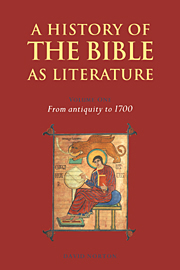Book contents
- Frontmatter
- Contents
- List of plates
- Preface
- List of abbreviations
- 1 ‘This treasure in earthen vessels’
- 2 The early Christians and biblical eloquence
- 3 Jerome
- 4 Augustine and his successors
- 5 The occult text
- 6 The challenge to the translators
- 7 Slaves of the Vulgate
- 8 Creators of English
- 9 From the Great Bible to the Rheims-Douai Bible
- 10 The King James Bible
- 11 Presentations of the text, 1525–1625
- 12 Sixteenth-century movements towards literary praise and appreciation of the Bible
- 13 The struggle for acceptance
- 14 ‘The eloquentest books in the world’
- 15 Versifying the Psalms
- 16 ‘The best materials in the world for poesy’
- Appendix
- Bibliography
- General index
- Biblical index
- Plate section
4 - Augustine and his successors
Published online by Cambridge University Press: 05 June 2012
- Frontmatter
- Contents
- List of plates
- Preface
- List of abbreviations
- 1 ‘This treasure in earthen vessels’
- 2 The early Christians and biblical eloquence
- 3 Jerome
- 4 Augustine and his successors
- 5 The occult text
- 6 The challenge to the translators
- 7 Slaves of the Vulgate
- 8 Creators of English
- 9 From the Great Bible to the Rheims-Douai Bible
- 10 The King James Bible
- 11 Presentations of the text, 1525–1625
- 12 Sixteenth-century movements towards literary praise and appreciation of the Bible
- 13 The struggle for acceptance
- 14 ‘The eloquentest books in the world’
- 15 Versifying the Psalms
- 16 ‘The best materials in the world for poesy’
- Appendix
- Bibliography
- General index
- Biblical index
- Plate section
Summary
Augustine: divine inspiration and eloquence
Saint Augustine (354–430), the most authoritative and influential of the western Church Fathers, believed both the Septuagint and the Hebrew OT to be divinely inspired and inerrant, yet he did not know Hebrew and, for most of his life, ‘he did not possess a working knowledge of Greek that could enable him to acquaint himself with Greek authors without intermediary’. The Bible he read was the Old Latin Bible that he had originally found so poor as Latin. He inherited from his rhetorical education a sense of the division between style and content, but before he first read the Bible he had reversed the common balance and weighed content ahead of form. In this way he regarded the Bible, from his first reading on, as the supreme book. But what is most interesting, and was to prove most influential for medieval and Renaissance literary attitudes, is that he eventually came to regard the Old Latin Bible as admirable in style, a view he gave powerful expression to in the fourth book of his On Christian Doctrine. This, a guide for the education of the clergy, was to be much used in the Middle Ages, and its prestige was such that it was the first of his works to be printed. Some of the third and all of the fourth book were additions made near the end of his life (427) to a work begun some thirty years before.
- Type
- Chapter
- Information
- A History of the Bible as Literature , pp. 41 - 52Publisher: Cambridge University PressPrint publication year: 1993



